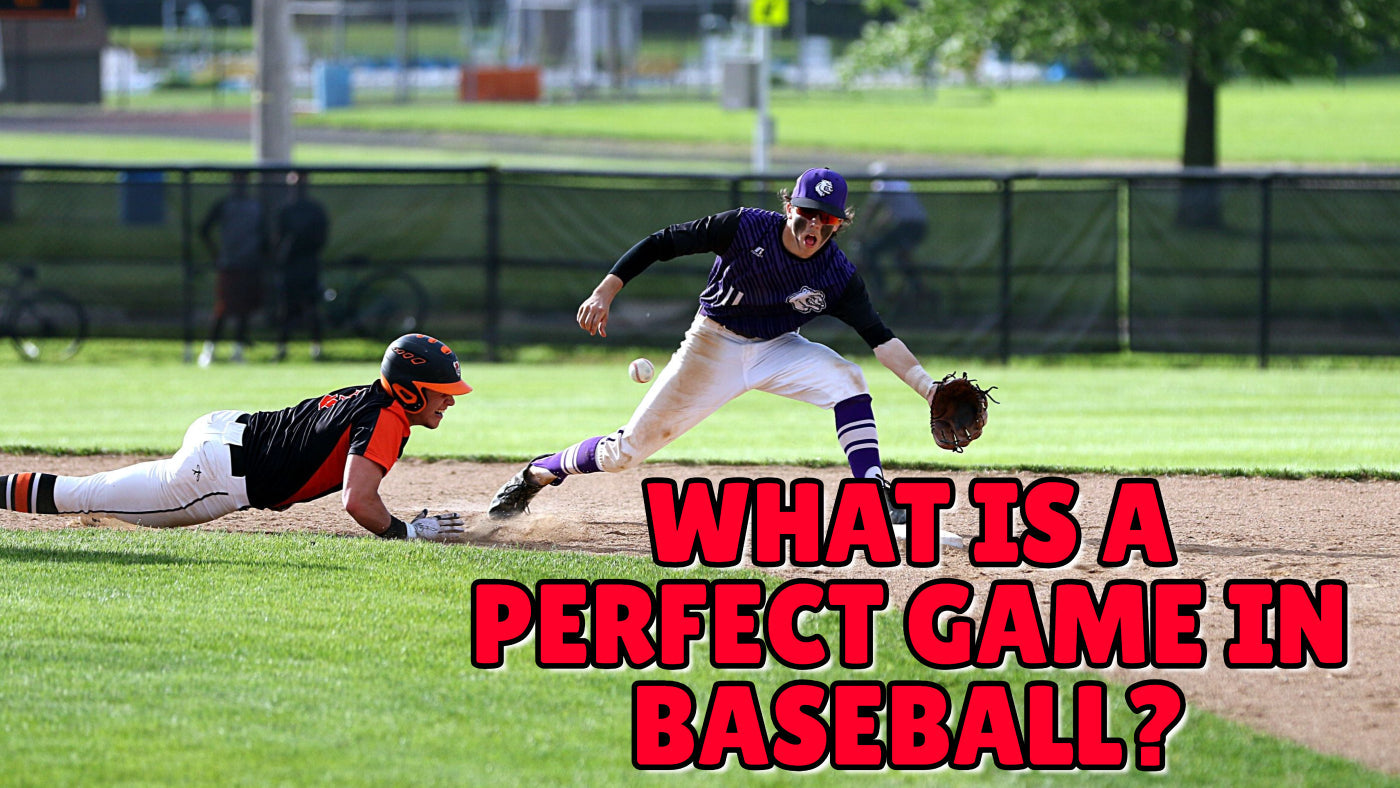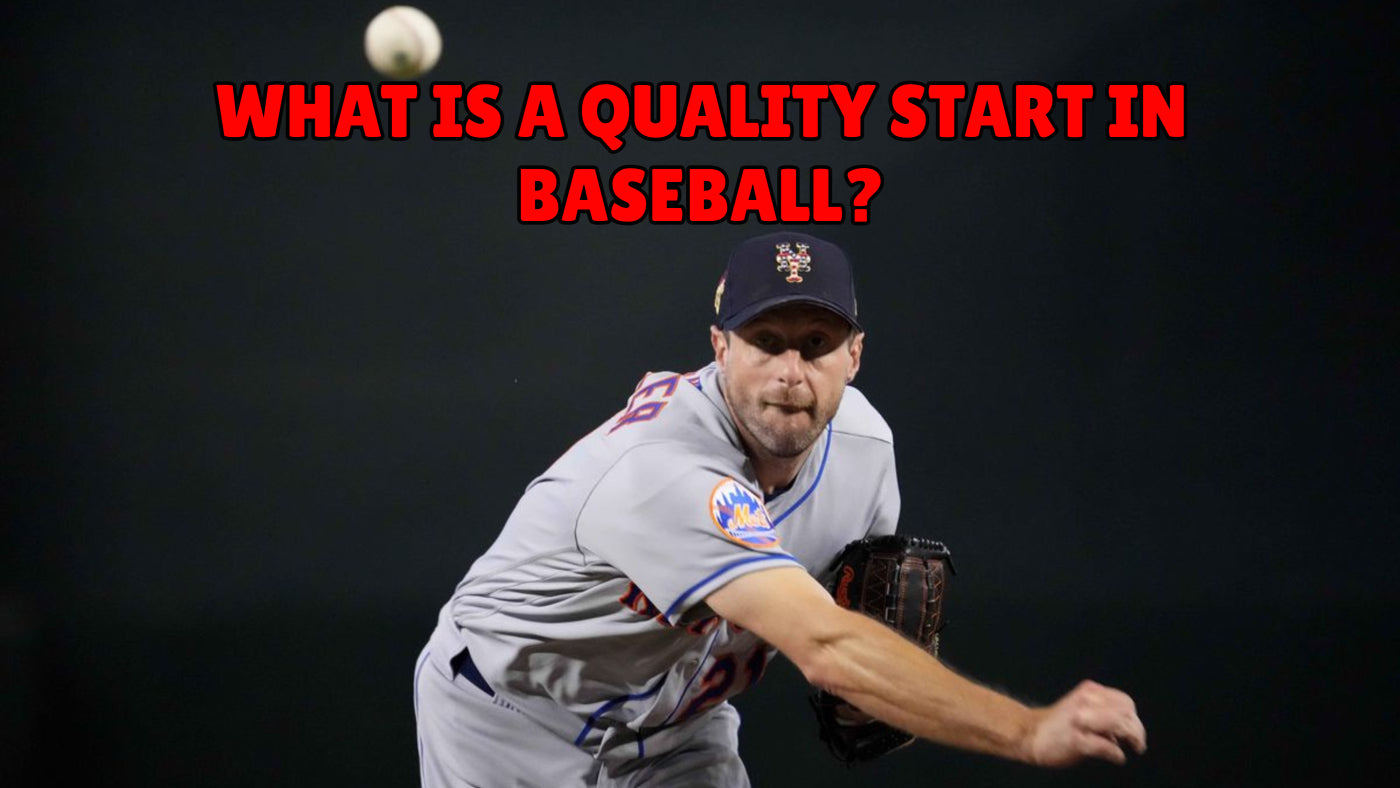Your Cart is Empty
- Ornament 🔥
- Gift for Family 🏠❤️
-
Pet
-
Memorial
-
Products
-
Home & Garden
-
Accessories
- Happy Customers ❤️
What Is A Perfect Game In Baseball?
July 12, 2023 7 min read

Baseball is a sport filled with remarkable moments and extraordinary achievements, but none are quite as rare and awe-inspiring as a perfect game. In this comprehensive guide, we will explore the concept and significance of a perfect game in baseball, delving into its definition, historical context, notable examples, and the various elements that contribute to its rarity and prestige.
Contents
1. Understanding the Perfect Game in Baseball 2. Difference between no-hitter and perfect game in Baseball 3. Difference between complete game and perfect game in Baseball 4. Appreciating the Rarity of Perfect Games in Baseball 5. Notable Perfect Games in Baseball History 6. How many perfect games in MLB history? 7. Who has pitched a perfect game in Baseball? 8. Conclusion

"Yankees pitcher throws a perfect game"
1. Understanding the Perfect Game in Baseball
A perfect game in baseball is an extraordinary feat accomplished by a pitcher or a combination of pitchers who retire every opposing batter without allowing a single player to reach base through a hit, walk, hit-by-pitch, or error. It is the pinnacle of pitching excellence, showcasing a pitcher's dominance, skill, and composure. It is important to distinguish a perfect game from a no-hitter, as the latter allows baserunners via walks, errors, or hit-by-pitch, while the former represents perfection in its purest form.
A perfect game in baseball refers to a game in which a pitcher or a combination of pitchers from one team retires every opposing batter without allowing any of them to reach base through a hit, walk, hit-by-pitch, or error. In other words, no opposing player can reach first base in any way during the entire game.
To achieve a perfect game, the pitcher(s) must record 27 consecutive outs, resulting in a complete game that consists of nine innings. Perfect games are extremely rare and considered one of the most impressive feats in baseball. They require not only exceptional pitching skills but also some degree of luck and defensive prowess from the pitcher's team.
2. Difference between no-hitter and perfect game in Baseball
A no-hitter and a perfect game in baseball are both significant achievements in baseball pitching, but they have slightly different definitions and criteria.
- No-Hitter: A no-hitter occurs when a pitcher or a group of pitchers prevents the opposing team from getting a hit over the course of a complete game (typically nine innings). This means that no batter on the opposing team successfully reaches base through a hit during the entire game. However, the pitcher can still allow batters to reach base through walks, hit-by-pitches, errors, or other defensive miscues.
- Perfect Game: A perfect game is a more specific and rare occurrence within the realm of no-hitters. In a perfect game, not only does the pitcher or pitching team prevent the opposing team from getting a hit, but no opposing batter reaches base in any manner. This means that in addition to not allowing hits, the pitcher must also avoid issuing any walks, hit-by-pitches, or benefiting from any defensive errors or mistakes by the fielders. Every batter faced must be retired in order for a game to be considered a perfect game.
In summary, a no-hitter refers to a game in which no hits are allowed, but batters may still reach base through walks, errors, or other defensive mishaps. On the other hand, a perfect game is a more stringent achievement where no opposing batter reaches base in any manner, resulting in a flawless performance by the pitcher or pitching team.
3. Difference between complete game and perfect game in Baseball
A complete game and a perfect game are related concepts in baseball pitching, but they have different meanings and criteria:
- Complete Game: A complete game occurs when a pitcher starts a game and pitches for the entire duration without being relieved by another pitcher. In other words, the same pitcher remains on the mound from the first pitch to the last pitch of the game. The pitcher completes the full game, regardless of the number of hits, runs, or baserunners allowed. A complete game can include both excellent performances and subpar outings, as long as the pitcher remains on the mound for the entire game.
- Perfect Game: A perfect game, on the other hand, is a specific type of complete game that represents the highest level of pitching excellence. In a perfect game, the pitcher not only completes the entire game but also prevents the opposing team from reaching base in any manner. This means that no opposing batter successfully reaches base through hits, walks, errors, hit-by-pitches, or any other means. Every batter faced is retired, resulting in a perfect combination of skill, precision, and dominance on the part of the pitcher.
In summary, a complete game refers to a game in which a pitcher starts and finishes the game without being replaced, regardless of the number of hits or baserunners allowed. A perfect game is a special type of complete game where the pitcher not only completes the entire game but also achieves the rare feat of retiring every batter faced without any of them reaching base. A perfect game is the epitome of pitching perfection, representing a flawless performance by the pitcher.
4. Appreciating the Rarity of Perfect Games in Baseball
Perfect games in baseball are extraordinarily rare, and their statistical analysis reveals their remarkable nature. The probability of witnessing a perfect game in any given baseball season is incredibly low, highlighting the rarity of such an accomplishment. Comparing perfect games to other rare feats in baseball, such as hitting for the cycle or throwing a no-hitter, further emphasizes their unique standing.
The impact of a perfect game on a pitcher's career and legacy is profound. It solidifies their place in baseball history and elevates their status among the game's greats. It becomes a defining moment that is remembered and revered for generations to come.
5. Notable Perfect Games in Baseball History

"Cy Young's perfect game in 1904”
Throughout the history of Major League Baseball, there have been several perfect games that have etched themselves into the annals of the sport. Let's explore some of the most notable examples:
Cy Young's perfect game in 1904 was a seminal moment in baseball history. Young, a legendary pitcher and namesake of the prestigious Cy Young Award, demonstrated his unparalleled mastery on the mound.
Sandy Koufax's perfect game in 1965 stands as a testament to his dominance during the 1960s. Koufax's pitching prowess and the significance of his achievement cemented his status as one of the greatest pitchers of all time.
Randy Johnson's perfect game in 2004 showcased his sheer dominance and intimidating presence on the mound. Known for his blazing fastball and devastating slider, Johnson's perfect game solidified his place among baseball's elite.
Roy Halladay's perfect game in 2010 was a testament to his unwavering focus and skill. Halladay's meticulous preparation and unwavering dedication paid off, as he etched his name in baseball history with a flawless performance.
6. How many perfect games in MLB history?
In the illustrious history of Major League Baseball (MLB), a total of 24 perfect games have been thrown, marking an extraordinary achievement for the pitchers involved. A perfect game represents the pinnacle of pitching excellence, as it requires not only a complete absence of hits but also an immaculate performance with no opposing batters reaching base through walks, errors, or any other means.
Among these 24 perfect games, 22 have taken place during MLB's modern era, which began in 1901. This highlights the rarity and difficulty of accomplishing such a feat, considering the vast number of games played since the inception of the league. The fact that only 24 perfect games have occurred in over a century of professional baseball further emphasizes their exceptional nature.
One notable aspect of perfect games is that they are started and finished by the same pitcher. Unlike some no-hitters, which can involve multiple pitchers combining their efforts to deny hits, a perfect game is the sole responsibility of a single pitcher. This adds an extra layer of individual brilliance and places the spotlight firmly on the pitcher's extraordinary performance.
Interestingly, despite the remarkable achievement of throwing a perfect game, only seven pitchers who have accomplished this feat have been elected to the Baseball Hall of Fame. This seemingly disproportionate number adds an intriguing element of randomness to the selection of perfect-game pitchers enshrined in the Hall of Fame. While the perfect game is a testament to a pitcher's skill, the criteria for Hall of Fame induction considers various factors, including overall career performance, longevity, and other statistical achievements.
In summary, the 24 perfect games in MLB history stand as extraordinary accomplishments within the sport. The rarity, individual nature, and varying Hall of Fame outcomes associated with these perfect games contribute to their mystique and make them highly revered moments in baseball lore.
7. Who has pitched a perfect game in Baseball?
In the history of baseball, there have been 23 pitchers that pitched a perfect game. The first recorded perfect game happened in 1880 by Lee Richmond, and the most recent perfect game was in August of 2012 by Felix Hernandez. There has not been a perfect game since. Here is a full list of all 23 pitchers who have thrown a perfect game in Major League Baseball.
Lee Richmond (June 12, 1880)
- John Montgomery Ward (June 17, 1880)
- Cy Young (May 5, 1904)
- Addie Joss (October 2, 1908)
- Charlie Robertson (April 30, 1922)
- Don Larsen (October 8, 1956, World Series Game 5)
- Jim Bunning (June 21, 1964)
- Sandy Koufax (September 9, 1965)
- Catfish Hunter (May 8, 1968)
- Len Barker (May 15, 1981)
- Mike Witt (September 30, 1984)
- Tom Browning (September 16, 1988)
- Dennis Martínez (July 28, 1991)
- Kenny Rogers (July 28, 1994)
- David Wells (May 17, 1998)
- David Cone (July 18, 1999)
- Randy Johnson (May 18, 2004)
- Mark Buehrle (July 23, 2009)
- Dallas Braden (May 9, 2010)
- Roy Halladay (May 29, 2010)
- Philip Humber (April 21, 2012)
- Matt Cain (June 13, 2012)
- Félix Hernández (August 15, 2012)
- Yusmeiro Petit (August 22, 2021)
8. Conclusion
A perfect game in baseball is the pinnacle of pitching excellence, where a pitcher or a combination of pitchers retires every opposing batter without allowing a baserunner. It represents a harmonious blend of skill, strategy, mental fortitude, and teamwork. The rarity of perfect games, coupled with their historical significance, ensures that these remarkable feats remain etched in the memories of baseball fans for eternity.
As we celebrate the beauty of the game, let us cherish the few and fortunate instances where the stars align, and perfection graces the baseball diamond. A perfect game is a testament to the unparalleled excitement and magic that can unfold in the world of baseball.
Related products for Baseball Lovers:

Hazel Edison
Hazel Edison's mission as a content marketer and social media manager is to help businesses connect with their target audience through engaging and informative content. With a deep understanding of the power of digital media, Hazel is committed to helping the brand build its online presence and drive results.
Related articles in Baseball

What Is a Quality Start in Baseball? Understanding the Pitching Metric
August 27, 2023 7 min read
Read More
 Track Order
Track Order
